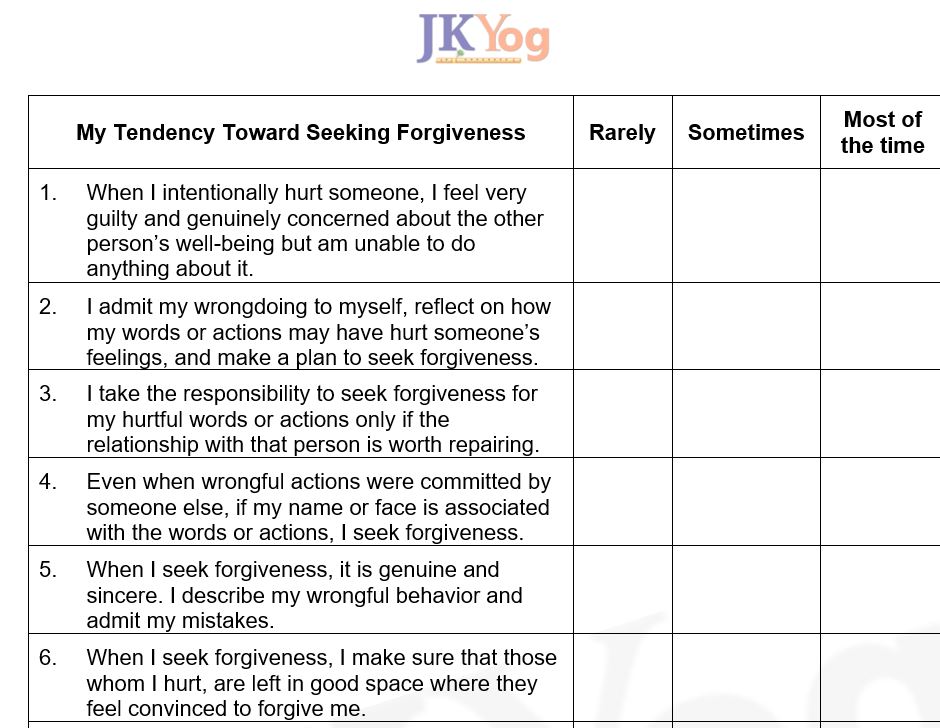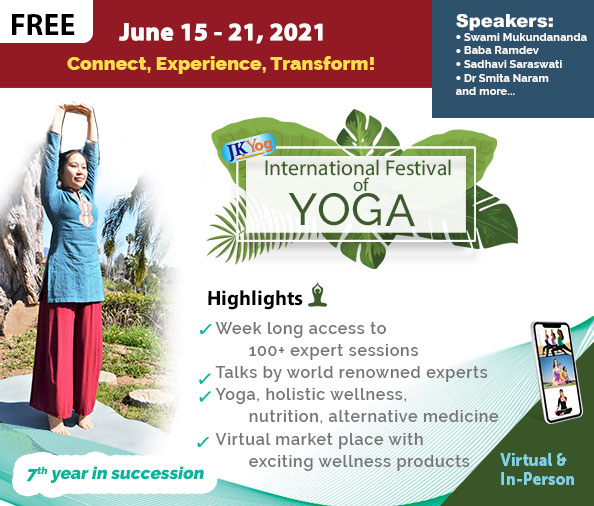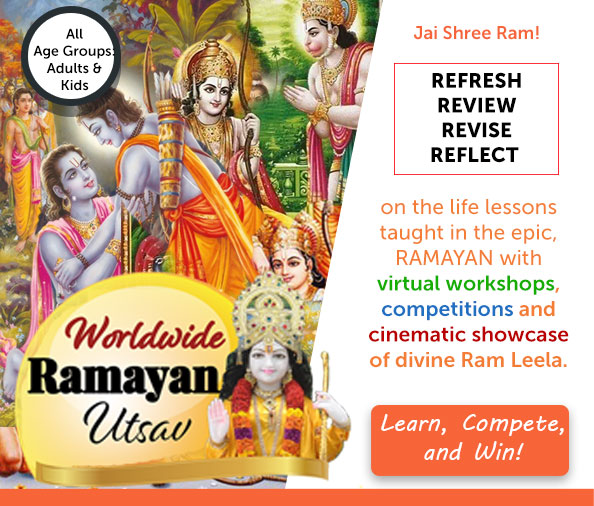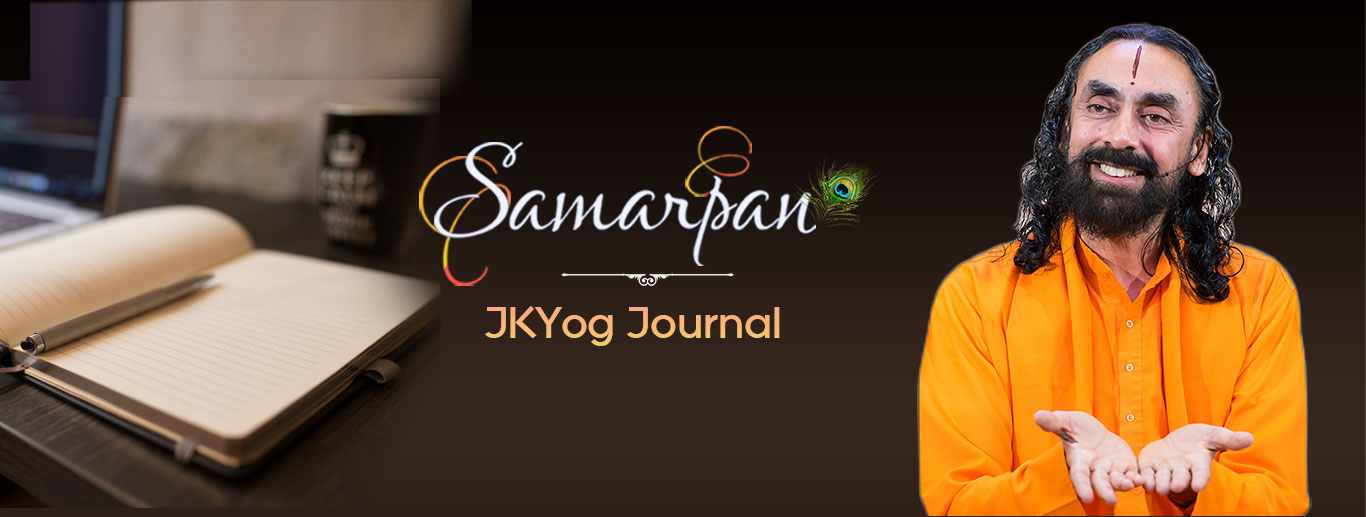
From the Editor’s Desk
All of us make all kinds of mistakes in our relationship with others because we are under the influence of Maya and subject to mental afflictions like ignorance, attachment, aversion, false pride, and fear. While we conceptually understand and want to learn to seek and grant forgiveness, we are not always successful in implementing that knowledge. Let us utilize the Vedic knowledge (i.e., tatvagyan) as taught by Swami Mukundananda ji to solidify our convictions.
The nature of this topic is such that before you read the contents, it may be more helpful to scroll down to the section on “Tools for Your Personal Growth” (The Forgiveness Barometer) to assess your own beliefs and tendencies towards forgiveness. Then, you may return to the Vedic Wisdom to better understand the tatvagyan.

Vedic Wisdom & Application
Challenge of the Month
Learn to Seek and Grant Forgiveness
Reflection Questions
- What is forgiveness?
- Why should we forgive others or seek forgiveness from others?
- How can we forgive when we are hurting?
What is Forgiveness?
In the Bhagavad Gita commentary, Swamiji defines forgiveness or forbearance as the ability to tolerate the offences of others, without feeling the need to retaliate. Through forgiveness, one heals the emotional wounds caused by others that would otherwise fester and disturb the mind (BG 16:1-3). Forgiveness does not mean that we forget the crime, but we let go of the hurt feelings and grudges. Forgiveness is freedom from ill-will even toward those who have harmed us.
Why Should We Forgive Others or Seek Forgiveness from Others?
Forgiveness is the most essential and crowning virtue on the spiritual path. Swamiji says that until we master this virtue, we cannot say that we have entered the spiritual realm. We live in an imperfect material world so obviously, we will repeatedly encounter people who will hurt us. But forgiveness is a divine virtue and eternal forgiveness is an expression of divine love.
We should forgive others because unless we do, the negative feelings will convert into resentment. Resentment is like toxic waste that creates internal emotional conflicts, mental imbalances, and physical health issues. To move ahead and grow spiritually, we must let go of resentment. If we hold a grudge, we will demean our own soul. By forgiving those who have harmed us, we can free ourselves from the internal torture.
We must rely on Vedic knowledge to understand that we all are materially conditioned souls. Just as we are not surprised to find sick people in hospitals, nor felons in prisons, we should not be surprised to find selfish and often evil people in this world. We all have been bereft of God-consciousness since endless lifetimes, therefore, we hurt others and experience hurt ourselves. If we want to be forgiven by those whom we hurt, it is equally important to forgive those who hurt us.
An interesting point to reflect upon is that sometimes, even God and Guru may deliberately present challenging situations to rattle us and test the extent of our selfless love. If we possess even a tinge of selfishness, then we will take offense and doubt their love. So, we have to understand this principle and even forgive God for challenging us in different ways. As Swamiji says, true love or bhav-bhakti is that where God presents a reason to be angry, yet the devotee takes it in stride as His prasad without being angry or feeling hurt. True love means eternal forgiveness which truly uplifts the soul.
In one of the beautiful lines in Shree Maharajji’s kirtan, “भूलिहुँ दुर्भावना कहुँ, हो न सपनेहुँ प्यारे,” (Bhulihun durbhavana kahun, ho na sapanehun pyare), he reiterates that we should not hold a grudge against anyone even in our dream. While positive thoughts uplift the soul, resentment degrades it completely. By practicing forgiveness, a person of discrimination, releases the negativities and purifies the mind (BG 13:8-12).
Finally, when we forgive others, God takes notice that the sadhak or devotee has elevated to a higher level and deserves more grace. So, if we want more grace, we should practice forgiveness, not just once but innumerable times.
It is just as important to seek forgiveness from others as it is to forgive people for their wrongdoing. The ability to identify and accept one’s own faults is a reflection of humility. We must seek forgiveness genuinely, accepting our own fault and finding ways to correct the wrongdoing. Asking for forgiveness should not be motivated by fear of retaliation or loss of privileges but be grounded in humility. Let us remember that God loves humble souls.
Our scriptures have presented many beautiful examples of how one should seek forgiveness. When Shree Krishna captured Kaliya naag, the naag-patnis (wives of Kaliya) humbly and repeatedly requested the Lord to let him go even though he was evil. Similarly, Lord Ram forgave Jayant who hurt Mother Sita out of ignorance of her divinity. The infinitely compassionate Lord forgives the souls when they seek forgiveness with humility and absence of pride. When Arjun witnessed the divine and cosmic form of Lord Krishna before the Mahabharat war, he was terrified and overwhelmed, but also regretful because he had related to God as a casual friend.
तस्मात्प्रणम्य प्रणिधाय कायं
प्रसादये त्वामहमीशमीड्यम् |
पितेव पुत्रस्य सखेव सख्यु:
प्रिय: प्रियायार्हसि देव सोढुम् ||44||
tasmāt praṇamya praṇidhāya kāyaṁ
prasādaye tvām aham īśham īḍyam
piteva putrasya sakheva sakhyuḥ
priyaḥ priyāyārhasi deva soḍhum
Therefore, O adorable Lord, bowing deeply and prostrating before you, I implore you for your grace. As a father tolerates his son, a friend forgives his friend, and a lover pardons the beloved, please forgive me for my offences (BG 11:44).
How Can We Forgive When We Are Hurting?
Forgiving and forgetting are difficult when our feelings are hurt. Swamiji says that it is easier to detach from material objects and people than it is to detach from pain and suffering caused by others. It is even more difficult to let go of resentment. But, until we rise beyond the hurt, we will not be able to move forward on the spiritual path because the resentment will kill us and degrade the soul. It is more productive to give up grudges not for the sake of the other person but for ourselves.
“The weak can never forgive. Forgiveness is the attribute of the strong.”
- Mahatma Gandhi
When others ask for forgiveness, we must release the ill-will from our heart. By forgiving those who have hurt us, we free up ourselves from the emotional pain. We control our mind and emotions instead of being controlled by the external environment. Besides, if our mind gets attached to those whom we resent, it will not be able to make room for positive and divine sentiments needed to attach the mind to God and Guru.
Here are some strategies to help us all increase the practice of forgiveness:
- Institute a forgiveness ritual before bedtime: Create your own meditation script to forgive others as a favor to yourself. Reward your soul by forgiving others even if they have not asked for forgiveness. Take the opportunity to earn divine grace.
- Manage your expectations: Ask yourself, “Are the people who hurt me God-realized souls?” If no, then why am I surprised that they do hurtful things? If yes, take the situation as a spiritual test. Tell yourself, “I must pass this test because God and Guru want what is best for my spiritual growth.”
- Increase tolerance as a way to cleanse the heart: Reflect on the importance of forgiving and forgetting wrong doings by others. As Swamiji says, “Let your critic vent out steam. You tolerate the hurt which will help to cleanse your heart.” Recall the knowledge that challenges are presented to strengthen us. Remind yourself that forgiving others and seeking forgiveness attracts divine grace from God and Guru.
- Focus on higher goals to let go of resentment: Struggles in life make us internally strong, resilient and effective problem-solvers. We can motivate ourselves to subdue the lower nature and focus on higher goals. The evidence of will-power lies in pursuit of superior goals (e.g., seeking and granting forgiveness) even if they require more effort than lower goals (e.g., resentment and anger) to which the mind is attached.
- Utilize the forgiveness barometer: On a monthly basis, assess your “forgiveness barometer” to observe changes in your own thinking and behavior over time (see “Tools” section below).

Tools for Your Personal Growth
The Forgiveness Barometer can help us to understand our beliefs and tendencies toward forgiveness and track the extent to which we are successful in applying Vedic knowledge to seek and grant forgiveness.
A downloadable tracking sheet is available for you to use. You can keep a printed or e-copy to track your progress. Remember, change takes time!

This tool can help us to understand our beliefs and tendencies toward forgiveness and to keep track of the extent to which we are successful in applying Vedic knowledge.

Love to Hear from You
- How did you apply the Vedic Wisdom?
- What challenges did you experience in the process?
Please share your comments under “Join the Discussion” below.

Gems of Wisdom from Swamiji
Here are some YouTube video titles and a related online media link where Swamiji describes the importance of forgiveness.
- Let Go Of Resentment | Get close to God (https://youtu.be/6l43LgZoOv4)
- The Power of Forgiveness (https://www.jkyog.org/power-forgiveness) (Dailypioneer)



Hold Your Breath! Check out Upcoming Events
We are very excited to share two dynamite events with you!

International Yoga Festival
JKYog’s goal literally is to spread the ancient science of Yog to the western world. A subset of what the ancient saints considered yog, is being practiced around the world as yoga, which tends to focus on the physical and mental aspects. The meaning of Yog, however, is to unite the soul with God, and it includes many activities, including spiritual activities to purify the Soul.
Each year, JKYog hosts an International Festival of Yoga to celebrate all aspects of this ancient science. This year too, there will be a week-long schedule of activities for in-person and virtual attendees from June 15-21, 2021.
- There are over 100 hours of planned sessions including Patanjali Yoga Sutras, yoga, meditation, pranayam, alternative medicine, and holistic medicine.
- Participate in one-on-one sessions planned with renowned Yog experts such as Swami Mukundananda, Swami Ramdev, and Sadhvi Bhagawati Saraswati.
- In addition to these distinguished guests, utilize the opportunity to increase your knowledge and practice through talks by medical professionals, yoga teachers, and other yoga practitioners.
- Stay tuned for specific session schedules but if past events are an indication, this year’s will be even better! Check out the beautiful memories of previous years, details for this year’s event and a registration link at the website.

WorldWide Ramayan Utsav (WWRU)
JKYog’s online events are attended by followers around the world and present a great opportunity to engage in spiritual growth. The Worldwide Ramayan Utsav is an unprecedented venture to bring another one of these great opportunities to the community. The Ramayan describes the leelas of Lord Ram with profound take-aways that can be used to guide our actions in the modern world. They talk of valor, courage, friendship, devotion, humility, and, ultimately, the perseverance of Dharma.
JKYog is celebrating this epic in numerous ways with a global competition. There will be contests in the areas of performing, visual, literary, and digital arts.
- Under performing arts, there are competitions for dance, bhajans, skit, instrumental music, and fancy dress.
- For visual arts, there are competitions for coloring, drawing, chalk, rangoli, sculpting, and jhanki.
- For literary arts, winners will be awarded for speech, debate, poetry, and quizzes.
- Digital arts competitions include video, coding, and a digital poster.
- The early bird registration discount is valid until May 24th. The deadline for all entries is July 5th. The awards ceremony will be held in August.
- In addition to individual winners who will receive trophies, medals, and/or certificates, there will also be a global champion – a “Ramayan Vidyapati” in each age group, based on the individual’s or team’s combined scores in ALL of the competition areas. More information and registration is available here.

Voices from the Global Community
Let us introduce you to a member of our global community who has been impacted by the scriptural knowledge as taught and disseminated by Swamiji.
This month, we feature Murali Krishna ji who is a software engineer by profession. His wife and he started volunteering for JKYog in 2009. He feels very fortunate to have found Swamiji as his Guru. As he was growing up, he saw life as a mystery with lots of unanswered questions. He found Swamiji's simple and yet powerful explanations from Vedic scriptures to be very thought-provoking. It brought clarity and purpose to his life. He appreciates that the spiritual journey is very long and challenging but Swamiji's guidance and association with the JKYog family, helped him to make progress. He looks forward to continuing more enriching years with JKYog.
Please watch the video where Murali Krishna describes how he benefitted from Swamiji’s teachings.
We invite you to share your inspirations and success stories with us at secretary@jkyog.org.









